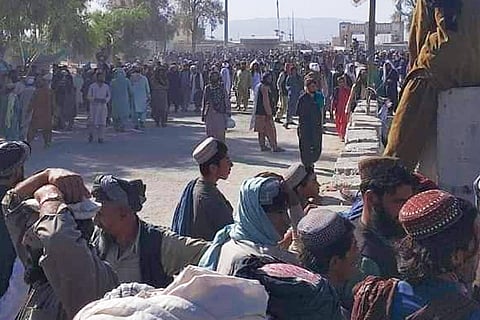

Afghanistan was bound to happen. Anyone who had visited the country in the last 20 years would have realised within a week that the international community was propping up an artificial Afghanistan. The idea of a more tolerant Afghanistan was more in the minds of the internationals than the countrymen that they wished to emancipate from the clutches of radicalism.
Billions were poured in and NATO soldiers, mostly made up of Americans who had never heard of Afghanistan until they were drafted, waged war in the name of peace. In their heart of hearts Afghans themselves were unsure about taking on the Taliban without international support. Technology and resources gave an edge to the Americans but clearly their hosts were no match to the battle-hardened Taliban who were willing to lay their lives down for their idea of Islam. No wonder the Afghan national army which had no such passion did not stand a chance.
Any number of institution building and women’s empowerment programs were carried out alongside. Tens of millions were sunk in this enterprise. INGOs reliant on resourceful NGOS who could work in areas that were considered off limits for the INGOs were the major beneficiaries. In due course most had learnt the art of project proposal writing and used jargon that was pleasing to the international developmental agencies. Reports year after year spoke of Afghanistan’s development even as those on the ground like myself remained sceptical. Of the 34 provinces quite a few remained outside the reach of the internationally recognised government. And even in those places like Logar which was just a two hour drive from the Taliban-ridden Kabul, the governors were not resident. They traveled from Kabul. Such was the woeful state of the government that the Afghans and the international community banked on to deliver. All Afghans concurred that the government was venal and corrupt.
What was wrong with Afghanistan? The Afghans appeared obsessed more with their faith than the country’s progress in which I now suspect they had little belief. Except for the violence and the brutal medieval practices of the Taliban, some even said that the Taliban were not corrupt. These folks didn’t see poppy cultivation or the heroin trade that bankrolled the Taliban as a major problem. Internationals worried more about these things. It was clear to me that the internationals were ahead in their love to save Afghanistan more than many Afghan men.
Even for those who had served elsewhere the deep-seated obsession with the practice and ways of the faith was a revelation. An Afghan doctor colleague said he will not allow his daughter to study more than was necessary. “And what would that be?” I asked a bit annoyed. “To read the Quran.” A colleague from Bangladesh, a Muslim said in despair, “If these are Muslims then I am not one.” He was the butt of jokes and was looked down upon by our Afghan colleagues. His ‘sin’ was that he skipped prayers and enjoyed a drink in the evenings.
Millions have been poured into by the international community to ‘foster dialogue’ - the favourite international jargon for taming radicalism and democratisation. Year after year international reports spoke of the ‘progress’ that Afghanistan was making. The yardstick was the elections. With each election, the international community patted itself on the back that democratisation was taking roots. It could not have been more wrong. The shame cannot be more acute that the western educated president, a suave and a well-heeled man had fled the country leaving ordinary Afghans to fend for themselves. It goes to show how vacuous international efforts have been and the absence of leaders in that cursed country. After all, what can you expect from a president who was an academic? All the toil and the moil that went in recalibrating Afghanistan had come to naught. Afghanistan had not only misunderstood Islam but it was sorely bereft of leaders who could lead by example or sacrifice. Most of their leaders were there for their own sake with their families safely parked in the neighbourhood or the West and frequently with the option of a safe haven.
Most commentaries are pinning the shame on the Americans. This is unfair. International efforts at institution building, democratisation, women’s empowerment and bringing host country nationals to believe in modern ideas such as education, development, women’s equality and environment are rarely organic. The best manure can be used; the plant can be regularly watered and sunshine could be aplenty but if the soil is not yet ready then these efforts become futile.
Afghanistan holds a few important lessons. The last three decades has seen a minority of Muslims going through an identity crisis. There could be many reasons including the West’s ‘unjust’ treatment of them in their view. But the path chosen by these radicals has done little to serve their cause or the cause of their brethren. It will remain unclear until later what prompted the American decision makers to quit Afghanistan. Certainly, it cannot be the ‘assessment’ that the Afghan institutions were ready to take up the challenge of fighting the Taliban without international help. It is likely that like this writer some involved in decision making may have realised that this was a hopeless and thankless task. Already more than 2,300 Americans have given their lives for a cause they would little understand. No responsible leader would sacrifice more of their daughters and sons. This war cannot be won quickly. It is a war over competing visions of faith between its adherents. The Americans should have pulled out soon after chasing out the Taliban and should have left the business of Afghanistan to Islamic countries. In matters of faith, it is best that fellow believers deal with the issue for faith and reason are two different things.
The writer who wishes to remain anonymous served in Afghanistan some years ago.